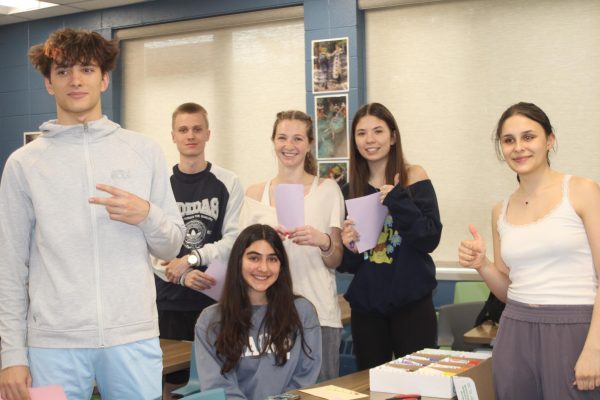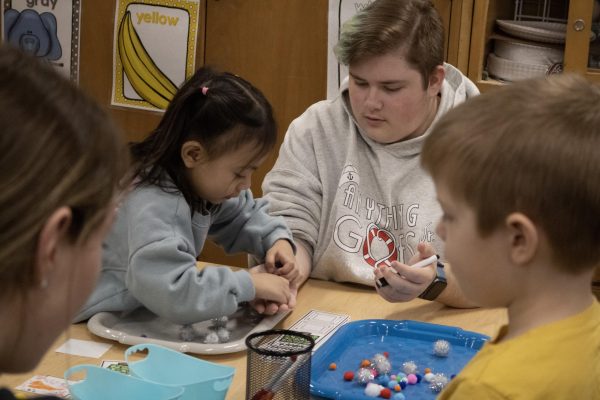Faith provides support, guidance
November 10, 2022
In the countryside of Mongolia, sophomore Row Seitz sat in a small tent, alone with a Shaman shielding his face with armor. As a drum thumped in the background, Seitz explained that she was instructed to drink the milk provided and to make a promise which would indefinitely change her life.
Touched by the spirit of Buddha, Seitz emphasized how meaningful it was for her to have met with this shaman as it allowed her faith to emerge. Religion, described by Encyclopedia Britannica as a connection with or belief in something considered holy or sacred, can affect those involved in a multitude of ways.
“[The shaman] didn’t know anything about me, but somehow he knew that I was going through a hard time,” Seitz said. “He asked me to make him a promise to do better in the future, and I decided to give him that promise. I couldn’t have [made that promise] for my friends, family, or even myself, so I started relying on [Buddhism] as my backbone.”
In Seitz’s eyes, the most resonant aspect of Buddhism is its followers tendencies to live humbly and always take everything positively. According to National Geographic, Buddhists dedicate their lives to the goal of reaching enlightenment, or Nirvana.
“[Buddhists] take everything as a blessing so that [we] can learn from what [we] did wrong and [know] how to move [forward] in the future,” Seitz said.
Also having found his faith in recent times, senior Owen Weisensel’s Catholic faith helps him navigate any challenges he may encounter.
“[God] is always there when you need Him for any guidance,” Weisensel said. “[Faith] helps me seek peace through everything.”
Despite having attended a Catholic school for ten years, Weisensel’s relationship with God was strengthened more than ever in the past year.
“When I was younger, I had a hard time believing [in God] because I was kind of forced into [Catholicism by] my family,” Weisensel said. “I started going to church more to find myself [recently], and I found great joy and happiness in my faith with God.”
David Berkson, Social Studies Teacher and Sponsor of Muslim Student Association (MSA), believes that religion can be a very vital aspect of a person’s identity and something to be proud of. He appreciates the community, confidence, and outlook it gives students.
“Belief, or lack of belief, has been a part of history from the earliest times,” Berkson said. “It [can be] such an important, personal part of peoples’ identities. [Students] should be [confident in] whatever [they] believe or whatever [they] don’t.”
Weisensel values the community he has gained because of his religion. Everyone at his church and youth group wants to see him grow, which motivates Weisensel to continue exploring his relationship with God.
“[The people at my church] are loving no matter what,” Weisensel said. “Everyone [greets each other] with smiles, hugs, and handshakes.”
Senior Inayah Mohammed similarily described her Muslim community as a loving and comfortable space. They have given her the support she needs to discover her own way of worshiping God, she explained.
“Respect is really big in [my] religion,” Mohammed said. “[Muslims are] understanding and [acknowledge] that everyone can practice religion in their own way and have their own spiritual connection that is unique and individual to them.”
Bryan Cope, Math Teacher and Sponsor of Cornerstone Christian Club, explained that this level of respect is necessary throughout all religions. With 49 percent of South students considering themselves to be religious, according to a non-scientific survey of 345 students conducted by The Oracle, Cope emphasized that it is important to learn about others’ beliefs rather than try to challenge them.
“Whether you’re Muslim, Jewish, athiest, Christian, or whatever other religions [are] out there, it’s not your job to change someone’s mind,” Cope said. “I think [people should be] willing to listen [to] why [others may] think the way [ they do].”
Berkson commended South for creating opportunities for students to learn about other religions if they choose to. From sophomore history electives, such as Religions of the East and Religions of the West, to religious clubs, Berskon encourages curious students to educate themselves.
“There’s so much [about religion] that we know, but there’s more that we don’t,” Berkson said. “[Students should find] that place to access information to learn about what other people believe and get that comparative experience.”
Having been a part of MSA since her freshman year, Mohammed cherishes the time she spends in the club environment. She shared that she has learned a great deal about her faith and practices through being in the club.
“Having those friendships and bonds with leaders that are my age have really helped me get through difficult things,” Mohammed said. “I think that’s something really special.”













